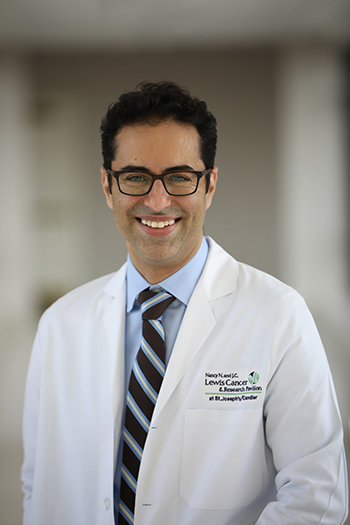Fact: Colonoscopy saves lives
Cancer
March is colorectal cancer awareness month, but we want everyone – especially young people – to get screened when it’s time
Over the last 10 or even 20 years, the number of cancer deaths in people 60 and older has been on the decline.
Seems like pretty good news. But, not all the trends in cancer deaths are positive.
An annual report from the American Cancer Society showed the number of people younger than 50 dying from colon cancer is on the rise.
In fact, colon cancer is now the No. 1 cause of cancer deaths in men younger than 50, and the second leading cause of cancer deaths in women younger than 50.
“That is concerning,” says Dr. Ajaz Bulbul, medical oncologist with St. Joseph’s/Candler Infusion Center in Hinesville, a partnership with the Lewis Cancer & Research Pavilion and Liberty Regional Medical Center. 
“When I saw the numbers it was very concerning because the rate in cancer deaths in people over 60 has been coming down for many years now, but in the young, the instances are going up. I was completely shocked.”
The numbers are so eye opening that it is now recommended you start colon cancer screening at age 45 as opposed to 50 if you are average risk. That means you don’t have a first-degree relative (father, mother, sibling) with a history of colorectal cancer.
If you are high-risk (family history of colon cancer, hereditary cancer carrier), you may need to start screening before 45. The recommendation is to have a colonoscopy 10 years prior to your first-degree relative’s cancer. Meaning, if your father was diagnosed at age 50, you should start screening at 40.
Related Article: Six frequently asked questions about colonoscopies
Colonoscopy saves lives
The best form of screening for colorectal cancer is colonoscopy. It has been proven to save lives.
“In colon cancer, the biggest thing is still prevention is better than cure,” Dr. Bulbul says. “There are cures in colon cancer that if you catch it in an early stage, cancer treatments are good enough that you can be cured. But, it’s still not as good as if you can catch it before it even becomes cancer.”
Colonoscopy has a 94 percent sensitivity rate of detecting malignant polyps, Dr. Bulbul says. A polyp is an abnormal growth of tissue. It’s usually benign but can become cancerous.
During a colonoscopy, the gastroenterologist can literally see if there are any polyps along the colon walls – as long as you properly prepared for the screening. Any polyps can be removed and biopsied. If it is cancer, and it’s found early, it’s very curable.
If nothing is detected, you are good for 10 years. If your doctor discovered polyps that are benign, you may be asked to come back between one to five years later.
There are other screening options available for average risk only. These include a FIT test and tumor DNA test. A FIT test studies your stool sample looking for blood. Blood in the stool is not a predictive of cancer, but could indicate a polyp. It has a sensitivity rate of about 78 percent, Dr. Bulbul says.
Another option is a tumor DNA test, such as Cologuard. It studies your stool looking for molecular changes and tumor shedding. It has a sensitivity rate of about 92 percent to detect colon cancer. It’s not very sensitive in detecting polyps, adds Dr. Bulbul.
So if you are 45 and are AVERAGE risk, and you aren’t ready for a colonoscopy, at least do a FIT or Cologuard test, Dr. Bulbul encourages.
But, he reminds everyone, it all circles back to colonoscopy. A positive result of either test doesn’t mean you have colon cancer, but only a colonoscopy can almost definitively determine that.
“Colonoscopy saves lives,” Dr. Bulbul says. “If you are getting a colonoscopy, you are at least 20 percent more likely to live longer. Why? Because you are getting scopes, and when it gets picked up early and you get treated for it early, you never have to deal with the risks of high-stage colon cancer or metastatic cancer.”
Risk factors for colon cancer
As stated, one of the best ways to prevent colorectal cancer is through screening. But it’s also important to know about the risk factors that could increase your likelihood of getting colorectal cancer.
Age and genetics are two of the biggest ones. We can’t do anything about that. But, there are environmental factors we can control. These include:
- Obesity
- Diabetes
- Alcohol use
- Smoking
- Poor diet, especially one high in red and processed meats
Related Article: Meat as a Side Dish: Is it OK to eat less or no meat during cancer treatment?
“As a preventive, the diet that has been shown to help lower your risk of colon cancer is mostly a plant-based diet with some occasional fish that is high in fiber,” Dr. Bulbul says. “We also know exercise has been shown to reduce multiple diseases and that applies to colon cancer too.”
Dr. Bulbul also advises to avoid excessive grilling and especially red and processed meat. One hundred grams of red meat a year will increase your colon cancer risk by 12 percent, while 50 grams of processed red meat will increase it by 16 percent.
“As long as you have a healthy diet and you have a healthy lifestyle and you start your screening at the right time, colon cancer can be a very preventable cancer,” Dr. Bulbul says.
You can get a colonoscopy at St. Joseph’s/Candler Center for Digestive Diseases locations at St. Joseph’s Hospital, Candler Hospital or our Pooler campus. When it’s time for your colonoscopy, be sure to talk to your primary care provider for a referral.